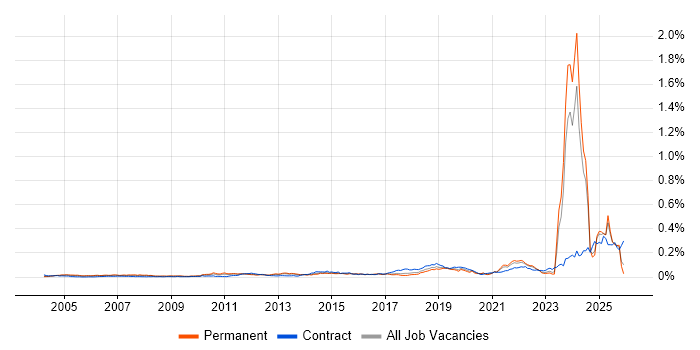Operational Stability
UK > UK excluding London
The table below provides summary statistics and salary benchmarking for jobs advertised in the UK excluding London requiring Operational Stability skills. It covers permanent job vacancies from the 6 months leading up to 11 January 2026, with comparisons to the same periods in the previous two years.
| 6 months to 11 Jan 2026 |
Same period 2025 | Same period 2024 | |
|---|---|---|---|
| Rank | 505 | 521 | 225 |
| Rank change year-on-year | +16 | -296 | +518 |
| Permanent jobs citing Operational Stability | 5 | 38 | 464 |
| As % of all permanent jobs in the UK excluding London | 0.012% | 0.11% | 1.34% |
| As % of the Processes & Methodologies category | 0.015% | 0.12% | 1.51% |
| Number of salaries quoted | 3 | 10 | 20 |
| 10th Percentile | - | £42,474 | - |
| 25th Percentile | £57,299 | £46,610 | £35,920 |
| Median annual salary (50th Percentile) | £59,720 | £68,750 | £36,128 |
| Median % change year-on-year | -13.13% | +90.30% | -51.83% |
| 75th Percentile | £99,821 | £92,068 | £70,236 |
| 90th Percentile | £122,428 | £140,677 | £155,665 |
| UK median annual salary | £76,000 | £76,000 | £62,968 |
| % change year-on-year | - | +20.70% | -8.41% |
All Process & Methodology Skills
UK excluding London
Operational Stability falls under the Processes and Methodologies category. For comparison with the information above, the following table provides summary statistics for all permanent job vacancies requiring process or methodology skills in the UK excluding London.
| Permanent vacancies with a requirement for process or methodology skills | 33,001 | 32,118 | 30,629 |
| As % of all permanent jobs advertised in the UK excluding London | 78.62% | 88.87% | 88.62% |
| Number of salaries quoted | 18,958 | 14,487 | 22,822 |
| 10th Percentile | £27,750 | £31,250 | £28,000 |
| 25th Percentile | £33,250 | £41,250 | £38,000 |
| Median annual salary (50th Percentile) | £50,000 | £55,000 | £52,000 |
| Median % change year-on-year | -9.09% | +5.77% | -5.45% |
| 75th Percentile | £65,000 | £70,000 | £66,250 |
| 90th Percentile | £80,000 | £83,750 | £80,000 |
| UK median annual salary | £55,000 | £60,000 | £60,000 |
| % change year-on-year | -8.33% | - | -4.00% |
Operational Stability
Job Vacancy Trend in the UK excluding London
Historical trend showing the proportion of permanent IT job postings citing Operational Stability relative to all permanent IT jobs advertised in the UK excluding London.

Operational Stability
Salary Trend in the UK excluding London
Salary distribution trend for jobs in the UK excluding London citing Operational Stability.

Operational Stability
Salary Histogram in the UK excluding London
Salary distribution for jobs citing Operational Stability in the UK excluding London over the 6 months to 11 January 2026.
Operational Stability
Job Locations in the UK excluding London
The table below looks at the demand and provides a guide to the median salaries quoted in IT jobs citing Operational Stability within the UK excluding London region over the 6 months to 11 January 2026. The 'Rank Change' column provides an indication of the change in demand within each location based on the same 6 month period last year.
| Location | Rank Change on Same Period Last Year |
Matching Permanent IT Job Ads |
Median Salary Past 6 Months |
Median Salary % Change on Same Period Last Year |
Live Jobs |
|---|---|---|---|---|---|
| Midlands | - | 2 | £59,720 | - | 2 |
| West Midlands | - | 2 | £59,720 | - | 1 |
| North West | +19 | 1 | £135,000 | +200.00% | 1 |
| North of England | +8 | 1 | £135,000 | +106.22% | 2 |
| South West | +3 | 1 | - | - | 3 |
| South East | - | 1 | - | - | 9 |
| Operational Stability UK |
|||||
Operational Stability
Co-Occurring Skills & Capabilities in the UK excluding London by Category
The following tables expand on the one above by listing co-occurrences grouped by category. They cover the same employment type, locality and period, with up to 20 co-occurrences shown in each category:
